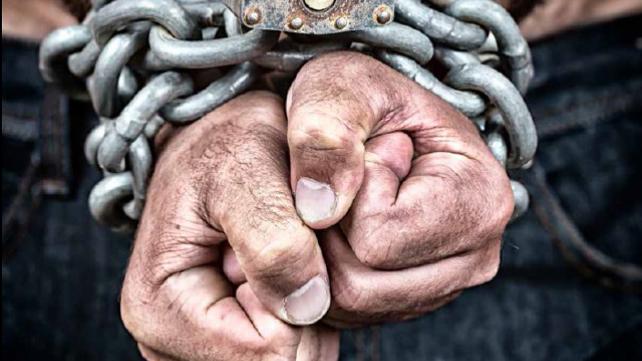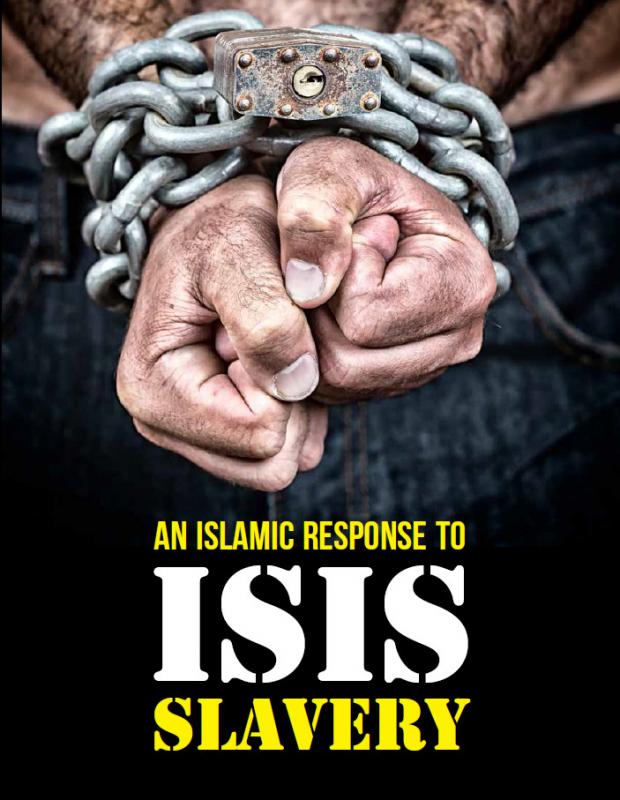
Thanks be to God that we now live in a world where there is a global consensus against slavery.
Our gratitude is intensified when we recognize that slavery was a persistent evil that existed not just in our ancient past as human beings, but continued until not very long ago in virtually all cultures and all religions.
Yet, despite this significant progress, slavery has not been eradicated in our world today. And religion is now being used to defend this sinful practice.
While we fight against different forms of slavery that persist today, there is a need for even louder faith-based voices against extremist groups like ISIS, which abuse the concept of slavery in Quran to justify their crimes of enslaving prisoners and taking female prisoners as concubines.
Although rape does not need a theology, ISIS claims to offer one.
For that reason, it is important to have a clear, informed response based on Islamic sources.
God’s commandment and Explanation of slavery in Quran to emancipate slaves
The Torah, the New Testament, and the Quran do not have any direct commandment calling for the abolishment of slavery. These scriptural revelations deal with the ancient practice of slavery as a fact of life in their historical context.
However, unlike the Jewish and Christian sacred texts, which do not have any implicit or explicit mention of eliminating slavery, the emancipation of slaves was clearly intended by God in the Quran. This resulted in Prophet Muhammad launching a comprehensive campaign against slavery.
God sets this goal for Muslims in the Quran, chapter 90, verses 10-14, to end this unjust practice of exploitation. This sacred text declares that the first task Muslims are commanded to do to achieve closeness to God is to free slaves. In a 2014 letter to ISIS leader Abu Bakr al-Baghdadi, more than 100 top Islamic scholars from several countries reaffirmed in a signed statement that this is what these verses mean.
Here are other references to the emancipation of slaves in the Quran:
Anti-Slavery ethics of slavery in Islam
- The equality of individuals, nations, and tribes is the cornerstone of Islamic ideals. (Quran 49:13, 4:1)
- Freeing slaves was among the top commandments to develop piety: (Quran 2:177, 90:1-14)
It is not righteousness that you turn your faces toward East or West; but it is righteousness . . . to spend of your substance . . . for the ransom of slaves. (Quran 2:177)
- Freeing a human being from bondage is the only way to make up for accidently killing another human being. Freeing a person is, therefore, comparable to giving life, and bondage to death (Quran 4:92)
- Free slaves to compensate for a sin or to compensate for a crime (Quran 5:89)
- Marry female slaves (Quran 4:25)
- Do not prostitute slaves (Quran 24:33)
- Free a slave to reconcile with one’s spouse (Quran 58:3-4)
- Sexual relations with a slave was lawful only through marriage (Quran 4:25)
- Nowhere does God prescribe slavery as punishment
Islamic financing for slave emancipation
The emancipation of slaves was not just limited to preaching. God created a permanent fund for it within the five pillars of Islam.
- God designated two specific categories of the Zakat distribution for the liberation of slaves and those in debt. This was because in many cases, debt leads to bondage (Quran 9:60). In practice, however, Muslims used six out of the eight categories of Zakat to free slaves.
- God commanded Muslims to accept contracts by slave women to buy their own freedom, and encouraged the owner to actually assist slave women financially in fulfilling such contracts (Quran 24:33).
Zakat is the most important Islamic obligation second only to prayers. It is 2.5% of one’s wealth given on an annual basis by those who are not destitute themselves.
God even chastises those who are not willing to share their wealth with slaves for the sake of an egalitarian society.
God has bestowed His gifts of sustenance more freely on some of you than on others: those more favored are not going to throw back their gifts with slaves, so as to be equal in that respect. Will they then deny the favors of Allah? (Quran 16:71)
Eliminating the term “slave”
God redefined the terms of “master” and “slave” as a loving relationship of obedience between Creator as Master and human beings as His slaves.
- In Arabic the term “Abd” was used for a slave. God forbade that relationship with any human being, making it exclusively between humans and God (Quran 3:79)
- That is why Muslims put the word “Abdul” (slave or servant of) in front of one of the Names of God when naming their children (e.g. Abdul Jabbar, Abdul Hakeem, etc.). It is not permitted to use the word “Abd” to describe a human-to-human relationship. That is also the reason Muslims don’t call each other “abdul” only, but instead, the full names “Abdul Malik” or “Abdul Kareem”, for example.
The Anti-Slavery movement led by Prophet Muhammad
Following the above stated commandments of God, the Prophet launched an anti-slavery movement in the following ways:
- He personally liberated all of his slaves
- Following the Prophet’s example, his Companions emancipated tens of thousands of slaves. It is estimated that they together freed more than 39,000 slaves[1]
- Prophet Muhammad was so eager to liberate slaves that those prisoners of war who did not have the financial means were promised their freedom if each of them taught ten Muslims how to read
- He also led a campaign against the practice by using spiritual censure. For example, he said that he would personally challenge anyone who had sold a free person as a slave on the Day of Judgment
- The Prophet expanded the Quranic injunction of freeing slaves as a method to expiate for sins, allowing more slaves to be emancipated
- The Prophet said “Whoever slaps his slave or beats him, his expiation is to liberate him.”
For Prophet Muhammad and his Companions, liberating slaves was not just an optional aspect of faith. It was a means of reaching spiritual excellence and closeness to God.
This is why Khadija, his wife, and Abu Bakr, both wealthy businesspersons, became almost penniless buying slaves their freedom.
It was because of this anti-slavery movement that most people who accepted the Prophet’s invitation to believe in One God and join his peace movement were slaves as was his treasurer Bilal ibn Rabah, May God be pleased with him.
This core message of the equality of all human beings (Quran 49:13) attracted Malik El-Shabazz (Malcolm X), Muhammad Ali, and Kareem Abdul Jabbar, among hundreds of thousands of African-Americans, as well as millions of former untouchables in India, to Islam.
The Prophet was an egalitarian. In his most famous sermon at the only Hajj he performed he declared:
"All men are like brothers: the black has no superiority over the white, nor has an Arab any preferential claim on a non-Arab. All are sons of Adam and Adam was made out of clay."
The only Quranic verse, 47:4, abused by ISIS through misinterpretation, authorizes the capture not of slaves but of prisoners of war.
This was ordered in a context when there was no prison system and there were no prisoner-of-war camps. Army commanders were either to free prisoners without financial compensation or to hold them for ransom.
While leading a movement toward the emancipation of slaves, the Prophet ordered all to treat slaves as their equals, declaring that slaves are merely brothers and sisters whom God has placed under one's authority. He ordered that they should all eat the same food and be equally clothed. Moreover, they should not be required to do what would overburden them, otherwise the owner should personally assist in carrying out the labor.
In the Quran, God praises those who followed the Prophet’s example in freeing slaves
“…of their burden and the shackles which were upon them…”, calling them the successful people (Quran 7:157).
Sex Slaves
In human history, enslaved women or concubines were sexual pawns, passed from owner to owner, often prostituted to the highest bidder. Unfortunately, a similar system continues today, but in a different form. Former United States President Jimmy Carter has said that in 2013 alone “there were 100,000 girls sold into sexual slavery” in America. This is the modern face of slavery.
Prophet Muhammad’s movement against slavery challenged this form of exploitation as well. It used both legal and moral measures to address it:
- It made the prostitution of all women illegal
- It prohibited dividing up slave families
- It asked Muslims to marry slave women (Quran 24:32)
- It legislated that sex can only be through marriage
- It commanded that the children of slave woman must inherit equally as children from a wife who is a free woman, and they must be set free. Their mother cannot be sold and must be freed.
Muslim men who owned female slaves were highly encouraged to emancipate them, instead of living in a system that promoted their exploitation. Prophet Muhammad said:
Whoever educates a slave woman, treats her nicely, liberates her, and marries her, will be rewarded twice.
In short, the aim was to end the sexual exploitation of women, and slavery generally.
How Muslims abandoned the Prophetic movement against slavery
Muslims inherited the ancient practice of slavery, but the Quran presented a comprehensive plan to end it and the Prophet launched a campaign to eliminate it.
Unfortunately, after the Prophet and his Companions passed away, the ideal period of Islam turned into kingship. Muslim kings, by and large, began adopting the ways of the world instead of pursuing the direction set by God and the Prophet.
Although there is nothing in Islamic history that compares to the horrors of slavery practiced in the United States, (for example, Muslim slaves established slave dynasties in Egypt and India), slavery did remain a fact of life throughout the world, including in Muslim lands. Muslim slave traders were also responsible for collaborating with Christian raiders and Jewish traders in the slave trade.
However, many examples exist in Islamic history of individuals and groups who fought against slavery and continued the Islamic tradition of liberating slaves. One such instance is the anti-slavery struggle of Othman Dan Fodio. When the West was harvesting slaves from West Africa, Muslims were a minority in those areas. But, thanks to Fodio’s movement, more and more people started living under his anti-slave trade areas of West Africa. This eventually led to the transformation of West Africa into a majority Muslim region.
Unfortunately, it is this history of the presence of slavery, along with an old corpus of legal opinions surrounding that practice in Muslim empires, that ISIS is using to build their theology of slavery and rape.
Why slavery cannot be revived
Slavery cannot be revived because it goes against God’s plan and the Prophet’s movement to eliminate it. It is against Islam’s core value of egalitarianism.
ISIS uses the mere mention of slavery in the Quran to justify slavery and rape, completely ignoring the clear Quranic direction toward elimination of slavery, God instituting funding for liberation of slaves, and the Prophetic emancipation movement. It is a clear violation of Islamic principles and teachings, as Islamic scholars in America and the Muslim world have made clear.[2]
Although ISIS doesn’t seem amenable to reason, here is an Islamic theological reasoning against the revival of slavery:
- Whereas God has never ordered anyone to establish slavery;
- Whereas not a single verse in the Quran commands that the practice of slavery be continued or reinstated;
- Since God has told us to follow Him, the Prophet, and our leaders (…ulil Amre Minkum Quran 4:59);
- and since our leaders and governments, have signed treaties to prohibit slavery;
- and since it is God’s command to abide by our treaties;
- and since this universal consensus of humanity does not violate any order of God or His Prophet, the treaties prohibiting slavery cannot be violated
therefore, slavery cannot be revived.
- Since the direction of the Quran is toward the liberation of slaves;
- Since this is the consensus (Ijmah) of Islamic scholars and the Muslims government;
- Since violating our treaties is a sin,
it is, therefore a sin to enslave free people now, or buy and sell them.
May Allah liberate the Ummah and humanity from this new fitnah.
You can download a pdf file of this article here for printing and distribution.
Sound Vision has printed this article and you can order it by sending an email to info@SoundVision.com for a larger quantity for free distribution.
A few other good articles on this topic
While revising this essay I came across the following articles which I benefitted from:
Muhammad The Abolitionist: Slavery In The Qur'an, by Adam Watson
ISIS says Islam justifies slavery - what does Islamic law say? By Professor Bernard Freamon
[1] https://en.wikipedia.org/wiki/Slavery_and_religion#Slavery_in_the_Bible
[2] http://www.lettertobaghdadi.com
Please download and share a thorough scholarly response to this menace.
>> An Islamic response to ISIS Revival of Slavery
© Sound Vision Foundation
Note: Please share this article using our share buttons below. However, for permission to distribute electronically or in print, please send an email to Copyrights@SoundVision.com. Thank you.









Comments
Very impressed and grateful
SALAAM Brother/Sister....MASHA-ALLAH very interesting, very true and highly knowledgeable; INSHA-ALLAH May ALMIGHTY increase us all in our HOLY QUR'AN ISLAMIC KNOWLEDGE. It's mind boggling when it comes to our HOLY QUR'AN KNOWLEDGE and our PROPHET MUHAMMAD SAW'S Teachings which were direct from ALMIGHTY ALLAH (THE ONE AND ONLY).ALLAH (SWT'S) WORDS ARE FINAL AND NEVER QUESTIONED....AAMEEN...THE CREATOR SUPREME OF SKILL AND KNOWLEDGE INFINITE..ALLAHU AKBAR ALLAHU AKBAR ALLAHU AKBAR
Location
Add new comment